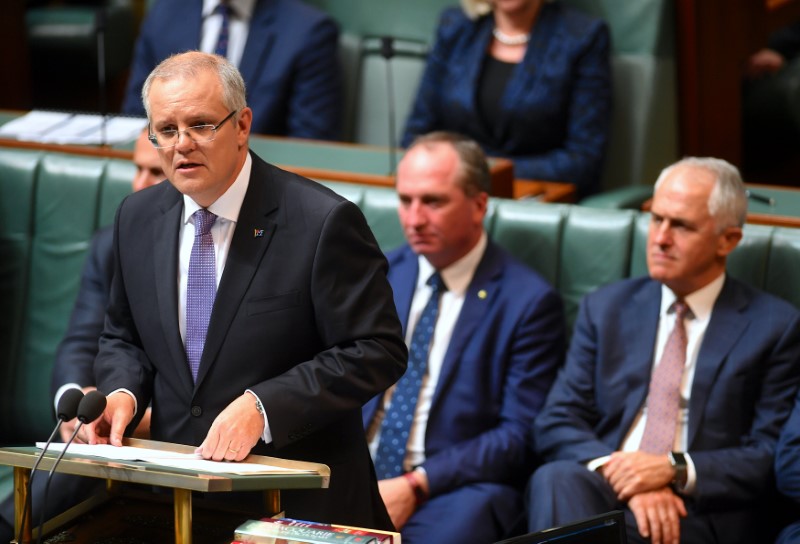By Swati Pandey
CANBERRA (Reuters) - The Australian government announced a six basis-point levy on the deposits of the country's five biggest banks in its annual budget on Tuesday, a measure that will deliver A$6.2 billion (£3.5 billion) through to 2020/21 as it aims to get its finances back into the black.
Australia's largest banks - Commonwealth Bank of Australia (AX:CBA), Westpac Banking Corp (AX:WBC), ANZ Banking Group (AX:ANZ), National Australia Bank (AX:NAB) and Macquarie Group (AX:MQG) - will pay the charge on their liabilities including corporate bonds, commercial paper, certificate of deposits and tier-2 capital instruments. Deposits by individuals and businesses are excluded.
"The levy is similar to measures imposed in other advanced countries," Treasurer Scott Morrison said in his budget speech.
"By reducing Australia's largest banks' funding cost advantages, the levy will also contribute to a more level playing field for smaller banks and non-bank competitors."
Australia's so called "Big Four" banks - CBA, Westpac, ANZ and NAB - together control 80 percent of the country's lending market and are extremely profitable.
The four reported a combined half-yearly profit of A$15.2 billion, up 6.2 percent from a year ago, in the latest round of financial results, with their average return on equity at nearly 14 percent - one of the best in the developed world.
"This new tax is not a well thought out policy response to a public interest issue, it is a political tax grab to cover a budget black hole," said Anna Bligh, chief executive of the Australian Bankers' Association.
"It is naive and misguided and has already sent the wrong signals to global financial markets about the strength and stability of our banking sector."
The banks also face headwinds including regulatory pressure to slow lending to speculative property investors amid worries about the risk of a debt-fuelled bubble in the market. Mortgages are a key source of profit for the "Big Four".
Aside from the levy, the government announced a reform package to strengthen accountability in the country's financial system. This is on top of Monday's announcement to initiate an inquiry into competition in the sector.
The moves are aimed at alleviating public concerns about the dominance of the big banks following a series of scandals in the banking sector and public allegations of abuse of market power.
Treasurer Morrison gave more ammunition to the banking regulator - Australian Prudential (LON:PRU) Regulation Authority (APRA) - to penalise banks and senior executives for misconduct. APRA will get A$4.2 million in additional funding over four years and an annual A$1 million for a fund to enforce breaches where banks fail to meet expected standards.
The government has also asked Australia's competition watchdog to undertake an inquiry on residential mortgage pricing until June 30, 2018.
"I wouldn't want to be a CEO of the "Big Four" banks tonight. This is a budget that is bad for banks which means it is a budget which is good for consumers," said Alan Kirkland, CEO of consumer advocacy group CHOICE.
The government has announced a number of measures over the past year to protect consumers and boost transparency in the banking sector, including beefing up the corporate watchdog's powers.
Australian banks have themselves promised unprecedented reforms, including reviewing sales commissions, supporting whistle-blowers and black-listing individuals for poor conduct.
